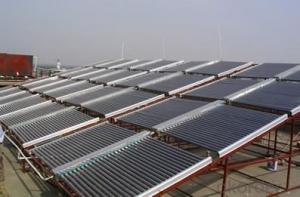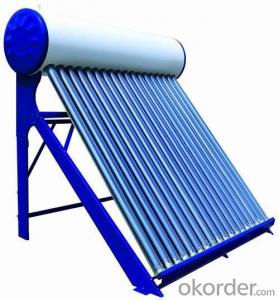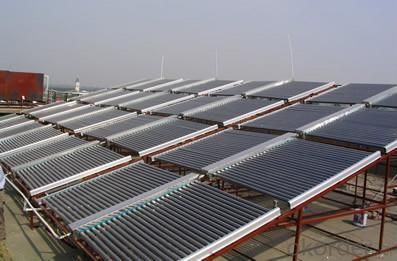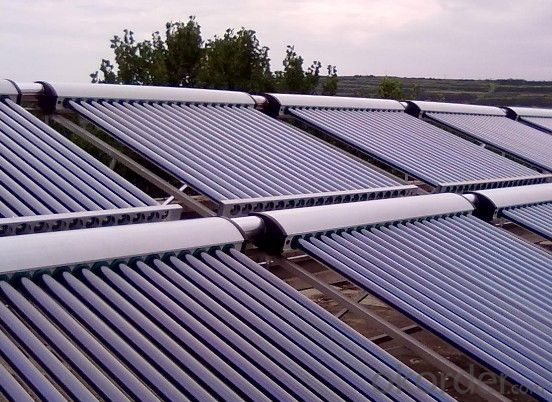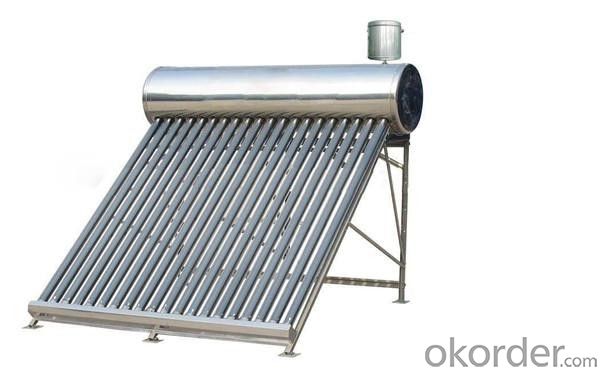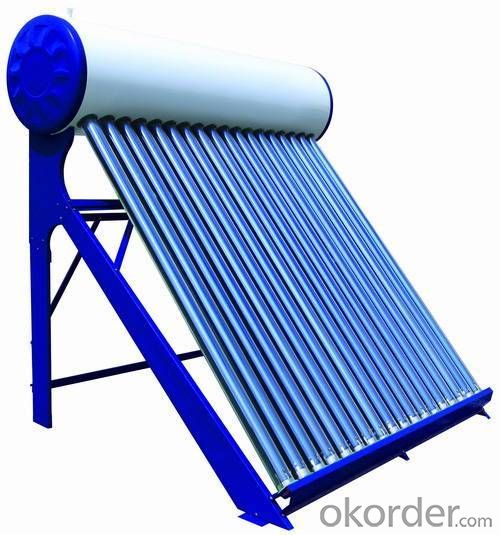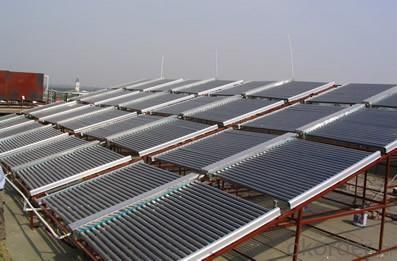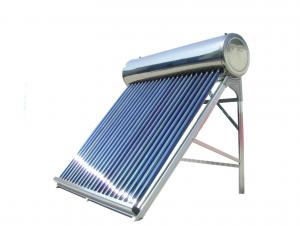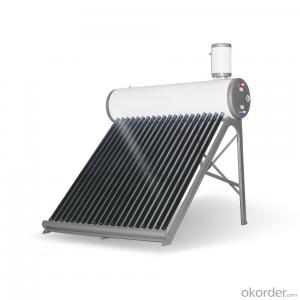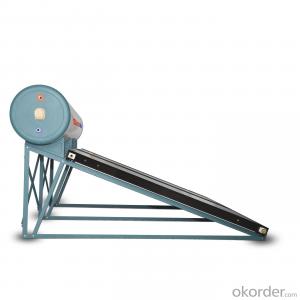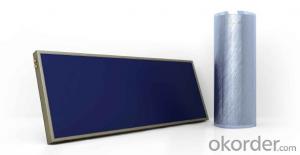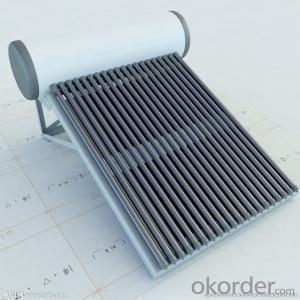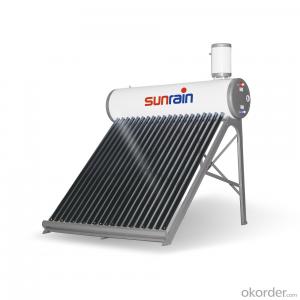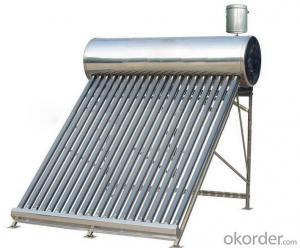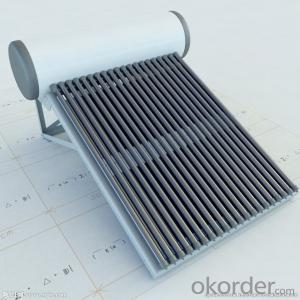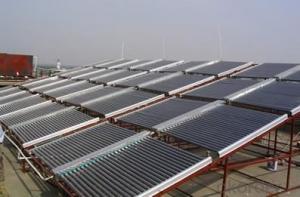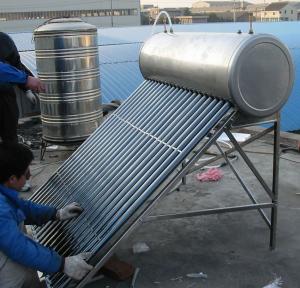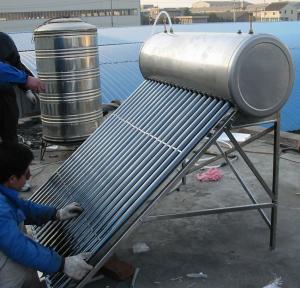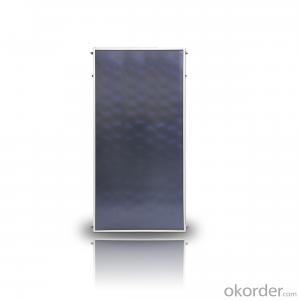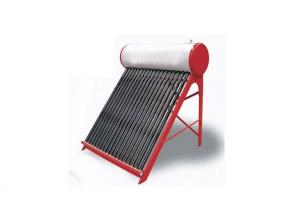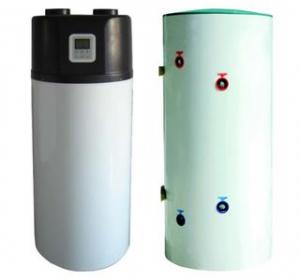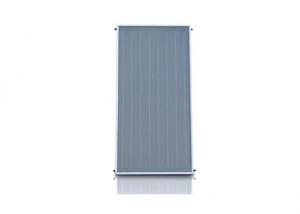20tube Non-Pressure Solar Water Heater Collector - Solar Water Heater Hawaii
- Loading Port:
- China main port
- Payment Terms:
- TT OR LC
- Min Order Qty:
- 10 set
- Supply Capability:
- 10000 set/month
OKorder Service Pledge
OKorder Financial Service
You Might Also Like
Solar water heaters features
1. The upright tank can make the water temperature to a high level. It can hot the water instantly
2. The tank inside the building, the hot water loses less energy than the normal one
3. The solar collector and the tank of solar water heater is separated, that makes the system combine with the building perfectly, which will reduce the sightseeing for the building and environment around
4. Back up with electric heater so that in the day without sunshine hot water can also be used
5. Can be combined with gas or electric heater
6. Max. Pressure: 12bar; Operating Pressure: 6 bar
7. It can be used for other function, such as warming
Solar water heaters working principle
1. The solar collector absorbs solar energy and transmits it to the solar water heater tank through circulation
2. When the temperature of the collector reaches the set value, the controller starts the circulation pump automatically
3. The circulation pump makes heat-conducting liquid circulate automatically
4. The heat-conducting liquid transfers heat to water by lower heat exchanger in the water tank.
5. When the temperature difference between solar collector and heat pipe solar water heaters tank doesn't reach the set value, the circulation pump will be shut automatically
6. In case the temperature of the water tank does not reach Tmax, Electric Heating Element will start to work automatically
Solar water heaters working station component:
1. Operating screen
2. Manometer
3. Pump speed adjust switches
4. Temperature difference circulation pump
5. Flow rate indicator
6. Return circuit connector
7. Safety valve
8. Expansion vessel connector9. Return circuit connector
10. Wall mounting
11. Expansion vessel:8L
12. Pressure resistance: 10 bar pressure for expansion vessel
Solar water heaters specification:
Description | solar water heaters |
Material of out manifold | 0.55mm thickness color steel/ fluorine carbon steel |
Material of inner tank | Food grade 2.0 mm thickness SUS304 stainless steel |
Tank insulating layer | 40mm 45kg/m³ high-density polyurethane foamed |
Inlet and outlet hole | Male G1'' |
Max pressure | 0.6 Mpa |
Solar collector tube | 3.3 Borosilicate glass with N/Al coating |
Thickness of glass tube | 1.6mm |
Vacuum tube tightness | P≤0.005 Pa |
Absorption | as=0.93-0.96 (AM1.5) |
Emission ratio | εh=0.04-0.06 (80C±5C) |
Idle sunning property parameters | Y=220~260m2.C/KW |
Average heat loss coefficient | ULT=0.6~0.7W/(m2.C) |
Bracket: | 2.0mm thickness aluminum alloy |
Tank weight | 75KGS |
Tank size | 560mm Dia x 1810mm Height |
Tank capacity | 300L |
Solar collector | 2pcs 58x1800x15tube solar collector |
Absorber area | 2.811 m² |
Working station | SP116 working station |
Heat exchanger length | Upper:12m, Underside:18m |
Solar water heaters details show:
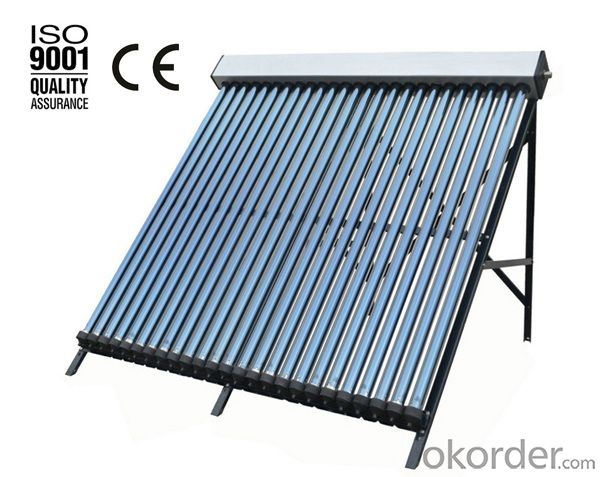
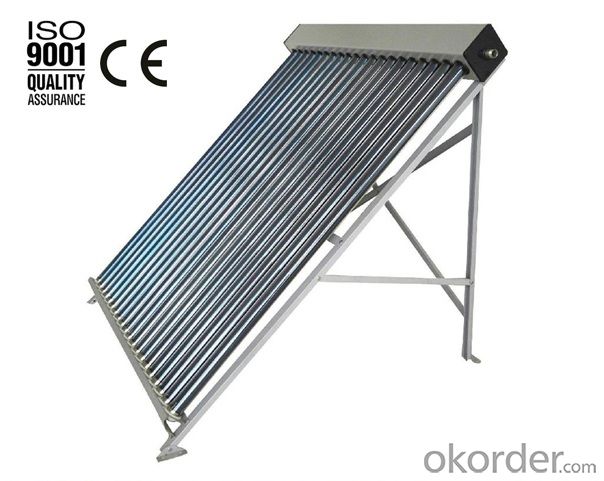
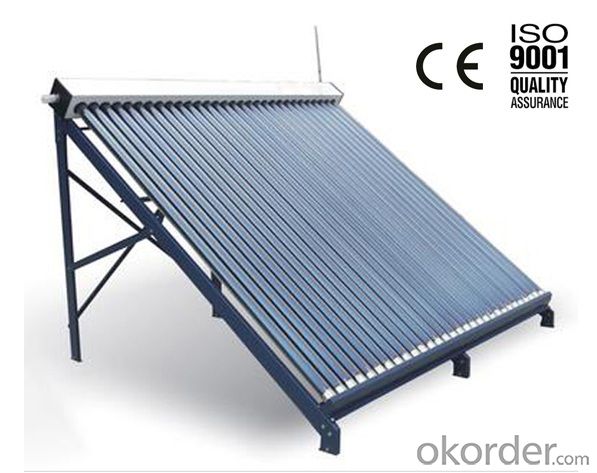
Benefits of this kind of solar water heaters:
1. Prolong the life of your existing water heater
2.Costs less than an electric, gas or oil water heater
3.No maintenance required
4.Lasts longer than a traditional hot water heater
5.Reduce your water heating costs
- Q: Can a solar water heater be used in areas with high levels of air pollution from construction activities?
- Yes, a solar water heater can still be used in areas with high levels of air pollution from construction activities. The functionality of a solar water heater is not directly affected by air pollution. However, it is important to note that air pollution can indirectly impact the efficiency of the solar water heater. Air pollution can cause a layer of dust and grime to accumulate on the solar panels, reducing their ability to absorb sunlight effectively. This can decrease the overall efficiency of the solar water heater. Regular cleaning and maintenance of the solar panels can help mitigate this issue. Furthermore, if the air pollution is severe and consists of harmful chemicals or particulate matter, it may indirectly impact the quality of the water heated by the solar water heater. It is advisable to have a filtration system in place to ensure the water is safe for use. Despite these potential challenges, a solar water heater can still provide significant benefits in areas with high levels of air pollution. It can help reduce reliance on fossil fuels, lower utility bills, and contribute to environmental sustainability.
- Q: What is the expected lifespan of the control system in a solar water heater?
- The expected lifespan of a control system in a solar water heater can vary depending on the quality of the system, its components, and how well it is maintained. On average, a well-designed and properly maintained control system can last anywhere from 10 to 15 years. However, with regular maintenance and occasional component replacements, the lifespan can be extended further.
- Q: 6 people with a number of tubes to install solar water heaters
- According to the structure of the solar water heater is divided into vacuum tube solar water heater and flat type solar water heater, mainly vacuum tube solar water heater, occupy 95% of the domestic market share.
- Q: Can a solar water heater be integrated with an existing plumbing system?
- Certainly, it is entirely possible to incorporate a solar water heater into an already established plumbing system. In actuality, it is quite customary to retrofit solar water heaters into existing plumbing systems. The process of integration typically entails joining the solar water heater to the preexisting hot water line. This can be accomplished by incorporating a heat exchanger or a pre-heat tank that facilitates the flow of solar-heated water, allowing it to combine with the existing hot water supply. Furthermore, it is possible to install a backup heating system, such as a gas or electric water heater, in order to ensure a supply of hot water during periods of limited availability of solar energy. All in all, integrating a solar water heater with an existing plumbing system is a practical and efficient means of harnessing the sun's energy and reducing dependence on traditional water heating methods.
- Q: Can a solar water heater be used in areas with limited access to government support or incentives for renewable energy?
- Areas with limited government support or incentives for renewable energy can still utilize solar water heaters. These heaters provide a cost-effective and sustainable alternative to traditional methods of water heating. By harnessing the power of the sun, they reduce reliance on fossil fuels and lower energy bills. Although the initial cost of purchasing and installing a solar water heater may be higher in areas without government incentives, the long-term benefits outweigh this investment. Maintenance costs are relatively low, repairs are minimal, and the heaters have a lifespan of 20 to 30 years, resulting in significant savings over time. Moreover, solar water heaters do not depend on a constant supply of electricity, making them suitable for areas with limited power access or unreliable grid systems. This makes them particularly valuable in rural or remote regions where government support may be scarce. Additionally, integrating solar water heaters into existing systems is simple and does not require extensive modifications or infrastructure updates. This adaptability makes them suitable for a wide range of environments, even those with limited resources or government support. In conclusion, although government support and incentives can make solar water heaters more financially appealing, they remain a viable and beneficial option in areas with limited access to such assistance. The long-term cost savings, environmental advantages, and adaptability of solar water heaters make them a sustainable choice for water heating, regardless of government incentives.
- Q: What are the installation requirements for a solar water heater's temperature control system?
- The specific model and manufacturer of a solar water heater's temperature control system may cause variations in its installation requirements. However, it is important to consider some general guidelines and factors during the installation process. To begin with, proper installation and functioning of the solar water heater itself is crucial. This involves placing the solar collectors in a suitable location that receives sufficient sunlight, and connecting the necessary plumbing and electrical components. Regarding the temperature control system, there are several key requirements to keep in mind. One essential component is the temperature sensor, which measures the water temperature in the storage tank. The sensor should be positioned accurately to ensure precise temperature measurement, without being affected by external factors like direct sunlight or drafts. Moreover, the control system typically includes a controller or thermostat that regulates the solar water heater's operation. This controller may have specific installation requirements, such as a designated mounting location or a particular connection to the solar water heater. It is essential to carefully read and follow the manufacturer's instructions for installing the controller to ensure proper functionality. Additionally, the temperature control system may necessitate the installation of supplementary components, like valves or pumps, to control water flow and maintain the desired temperature. These components should be installed according to the manufacturer's instructions and might require professional assistance for plumbing or electrical work. Overall, the installation requirements for a solar water heater's temperature control system rely on the particular system in use. It is crucial to thoroughly review the manufacturer's instructions and guidelines to guarantee a proper and safe installation. If uncertain, it is advisable to seek assistance from a professional installer or technician with experience in solar water heater systems.
- Q: Are solar water heaters suitable for all climates?
- Solar water heaters are generally suitable for all climates, but their efficiency may vary based on the amount of sunlight available. In colder climates with less sunlight, additional insulation or a backup heating system may be necessary to ensure optimal performance.
- Q: How does a solar water heater affect the resale value of a home?
- A solar water heater can positively impact the resale value of a home. It is considered a valuable and sustainable feature that appeals to environmentally conscious buyers. The reduced energy costs associated with a solar water heater can also be attractive to potential homeowners, making the property more desirable and potentially increasing its resale value.
- Q: Are solar water heaters noisy?
- No, solar water heaters are not noisy. They operate silently as they do not have any moving parts or components that generate noise.
- Q: What is the impact of water contamination on the performance of a solar water heater?
- Water contamination can have a negative impact on the performance of a solar water heater. Contaminants, such as minerals, sediments, or chemicals, can accumulate in the system's pipes, tank, or heat exchanger, reducing its efficiency and effectiveness. These contaminants can hinder heat transfer, cause corrosion, clog pipes, and reduce the overall lifespan of the system. Regular maintenance, cleaning, and water treatment are essential to mitigate the impact of water contamination and ensure optimal performance of a solar water heater.
Send your message to us
20tube Non-Pressure Solar Water Heater Collector - Solar Water Heater Hawaii
- Loading Port:
- China main port
- Payment Terms:
- TT OR LC
- Min Order Qty:
- 10 set
- Supply Capability:
- 10000 set/month
OKorder Service Pledge
OKorder Financial Service
Similar products
Hot products
Hot Searches
Related keywords
